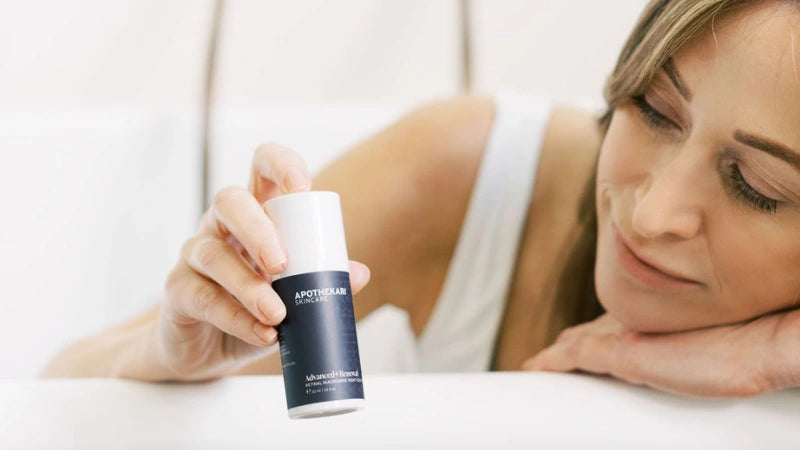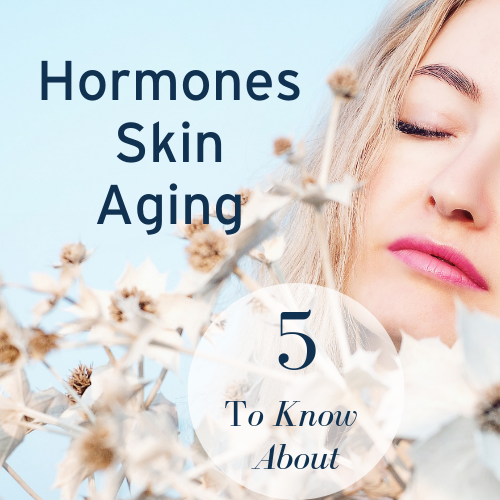Blog
Retinol & Retinoids: Your Complete Guide
You may be wondering if retinol (or another retinoid) has a place in your skin care routine. In this post we’ll explain why it’s important if you’re serious about healthy and beautiful skin. And, we’ll show you how to get this superstar ingredient into your life. Shop A Is for Anti-Aging Serum (Our Retinoid Formulation) Shop Active Eyes What is Retinol? Retinol is a form of vitamin A that you can find in skincare serums, creams and lotions, especially those marketed as “anti-aging”. Which is NOT a term we like to use around here, but which persists, nonetheless. (It’s why we’ve recently renamed our A is for Anti-Aging Serum to Advanced+ Renewal). It belongs to a class of ingredients know as retinoids, which are known for their ability to improve the appearance of fine lines, wrinkles, and uneven skin texture. And they’ve also been shown to be useful in the management of acne. Retinol may be the most well-known retinoid, but there are several others also used in skincare. Retinyl palmitate & Retinyl acetate. Very mild and gentle and available without prescription Retinaldehyde. Potent, but still gentle and found in our Advanced+ Renewal Serum. Available over the counter. Adapalene. Prescription only. Tazarotene. Prescription only. Tretinoin. Prescription only. Isotretinoin. Prescription only. Prescription forms tend to be stronger, and often more irritating to skin. If you feel you’re ready for one, your physician will be able to guide you towards the best option for your individual needs. What is Retinol Good For? As a class of ingredients in general, retinoids: Increase collagen production and decrease its breakdown, which minimize the appearance of fine lines and wrinkles along with scarring. Inhibit the production and transfer of melanin (skin pigment), which “prevents age spots from worsening and also helps to fade existing dark spots. Help unclog pores and minimize their appearance. Increase skin cell turnover, which helps replace old, dry, dead skin cells with younger, healthier ones. The result is that glow that we’re all after. Reduce transepidermal water loss, leaving skin looking more plump and hydrated. Retinol helps to improve the appearance and texture of skin. It diminishes the appearance of wrinkles and fine lines, smooths skin, fades age spots and hyperpigmentation and minimizes acne blemishes, so it’s a powerhouse ingredient to have in your skin care arsenal. Keep in mind that while retinol may be the most well known retinoid, that it’s not necessarily the best one. As effective as it is, it does come with some effects. What are the Negative Effects of Retinol? Retinol can result in some negative side effects, especially if it isn’t used correctly. Common side effects include redness, peeling, and dryness, which can be really disheartening when you start using it on a regular basis. Boo. Another way to minimize retinoid side effects is to start with a low concentration and gradually work your way up to a higher concentration. It’s also important to use retinol in combination with a good moisturizer and/or face oil to help prevent dryness and irritation. However, despite following good instructions on retinol use, you may still find your skin unable to tolerate it. In this case, you can opt for a more gentle retinoid, like retinaldehyde. Retinol vs Retinaldehyde Retinaldehyde—often simply called retinal—is retinol’s gentler, yet even more powerful cousin. And we’re BIG fans of this ingredient at Apothekari, which is why it’s included in our Advanced+ Renewal Serum, along with other actives. Retinal is also one step closer than retinol in converting to retinoic acid, making it more readily available for your skin to put it to good use. And, just like retinol, studies have shown that it minimizes the appearance of dark spots, fine lines and post-acne scarring. The kicker? It works just as well (possibly better than retinol), and with fewer side effects. It should be on everyone’s radar! What Does Retinol Do To Your Face? Once absorbed into your skin, it works by increasing the production of collagen. This helps to improve your skin’s appearance, especially by smoothing out wrinkles and fine lines. It can also increase skin cell turnover, which is why it’s useful in reducing acne blemishes and fading hyperpigmentation (age spots, etc). Can I Use Retinol Around Eyes? The skin around the eyes is thinner than skin on the rest of your face, and so quite prone to wrinkling. You absolutely can apply retinol and other retinoids around the eye. However, it’s important to be mindful as the thin skin results in greater absorption of ingredients and also has a higher potential for irritation. Using a low concentration product–including retinoid creams specifically formulated for the eye area–is a great option. They will contain either a lower concentration of retinoid, contain a gentle retinoid like retinyl palmitate or retinaldehyde; or include encapsulated retinol. Encapsulated retinol slowly releases retinol, rather than a big burst all at once, helping to minimize skin irritation. It’s an excellent way to treat the delicate skin around your eyes, where we’ve included it in our ActiveEyes Serum (along with peptides and other actives). Also remember to take the proper precautions, including using moisturizer to damp skin and sun protection. Is Retinol Good for Acne? Yes, it can absolutely help to treating acne. Because it increases cell turnover, this pushes newer, healthier skin cells to the surface, which in turn, prevents pores from clogging. It’s not always the most effective treatment for all types of acne, and if you find that it’s not working for you, check in with a dermatologist to find a better solution. How Do You Know if Retinol is Working? As with many skincare products, the impact of consistently using retinol and other retinoids can take time. You should allow at least 4-6 weeks before deciding whether it’s making a difference to your skin. Here are some signs that it may be working for you: Improved skin texture: The increase in skin cell turnover helps to smooth out bumpy and rough skin. Reduced fine lines and wrinkles: Collagen production is stimulated, which can help to reduce the appearance of fine lines and wrinkles. Brighter, more even skin tone: Improved skin tone by reducing the appearance of dark spots and hyperpigmentation. Fewer breakouts: Retinol helps to unclog pores, which reduces the frequency and severity of breakouts. When Should I Start Using Retinol? Most skin care experts advise starting retinoids in your late twenties, when the natural production of collagen and elastin in skin begins to decline. Introducing it earlier can help to prevent the signs of aging from appearing prematurely. Can I Use It Everyday? If you introduce it into your skincare routine gradually and aren’t experiencing any negative side effects (redness, irritation, peeling) then it’s perfectly safe to use it daily. However, we find that even if you introduce retinol gradually that it may cause skin irritation, especially if you have sensitive skin. The retinaldehyde in our Advanced+ Renewal Serum is not only more effective than retinol, it’s also more gentle, making it ideal for use in all skin types. In fact, many of our customers with sensitive skin are able to tolerate Advanced+ Renewal with great success after having their skin react to any other retinoid they’ve tried. Dos and Don’ts With Retinol? Do: Start with a low concentration of retinol and gradually work your way up to a higher concentration Use retinol at night. It is highly susceptible to damage when exposed to sunlight and it may also make your skin more sensitive to sun exposure. For this reason, make sure you’re apply sunscreen every day. Use a moisturizer to help prevent dryness and irritation Use consistently and be patient. It can take several weeks to see results Don’t: Use during the day as it degrades with exposure to sunlight and may also increase your skin’s sensitivity. Use if you are pregnant or breastfeeding Use in combination with other active ingredients like alpha hydroxy acids and low pH treatments without consulting a skincare professional. It’s generally safe to use them on alternate days. Use too much. Your skin can only absorb so much. Plus, this can lead to dryness and irritation Hope you enjoyed reading this!
Learn moreHormones, Skin & Aging: 5 Hormones You’ll Want to Know About
As you get older, you may be wondering about the connection between hormones, skin and overall wellness. And while there’s more talk about the topic these days, it’s still important to understand the intricate relationship between hormones and your skin’s health. So, let’s get to it! Shop All Apothekari Can Hormone Imbalance Cause Skin Problems? As we get closer to perimenopause and menopause, the hormone balance starts to change so you may start to notice a difference in the way your skin looks and feels. Hormones are chemical messengers, which tells cells–including skin cells–what to do. So when their balance is upset, you may very well notice a difference in your skin’s complexion. How Do Hormones Affect the Skin? There are many hormones in the human body and each play different roles when it comes to your health. In this post, we’re looking at five key players: estrogen, progesterone, cortisol, insulin, and testosterone, that can have an impact on your skin. Each one plays a unique role, but it’s also important to appreciate that they can have combined impact on your skin. Estrogen and Skin Aging. Our leading lady, estrogen, orchestrates the stages of puberty, pregnancy preparation, and overall skin vitality. However, estrogen gracefully takes a step back as we get older, leading to dryness and leaving our skin looking older. Stress and insufficient sleep–two factors that often come into play during the menopause transition–also influence estrogen production, which can impact the skin’s aging process. Progesterone and Skin Elasticity. Enter progesterone, the hormone which helps to enhance skin elasticity and blood circulation, ensuring that skin stays nourished. Yet, as time marches on, progesterone also starts to decline, leaving your skin looking lackluster. Menopause, stress, and health conditions all have the potential to disrupt the production of progesterone, and which can contribute to changes in skin texture. Cortisol: The Stress Hormone. Meet cortisol, often referred to as “stress hormone”, and which wreaks havoc not only on our mental state, but also can stage an aging performance on your skin. Studies reveal that stress-induced collagen loss, can lead to skin sagging, thinning and dullness, all resulting in a less vibrant complexion. Stress management is not only a wellness mantra; it’s also a crucial skincare strategy. Insulin and Skin Health. You may not think that insulin has much impact on how your skin looks, but it absolutely has an impact. Released in response to sugar consumption, insulin regulates blood sugar levels. High glycemic foods–you know, those cookies, donuts and sugary treats that many of us crave–might trigger insulin spikes, potentially impacting sleep and contributing to skin wrinkling. A gentle reminder that even our diet influences skin well-being. Testosterone and Skin Troubles. Whether in women or men, an abundance of testosterone might lead to unwanted acne. Aging introduces a double-whammy twist–women experience an increase in testosterone, which can bring about an increase in breakouts, while also experiencing a decrease in estrogen, resulting in drier skin. Does Balancing Hormones Help Skin? It makes sense that balanced hormones would be just the remedy that picky skin would benefit from. However, this is still a controversial topic in the field of medicine. If you feel that it’s something that you want to explore, check in with your doctor to discuss options and whether it makes sense for you. How Can I Balance My Hormones for Clear Skin? While your hormone levels can be up, down and all over the place as you get older, especially during the menopause transition, you can influence their levels to some extent. Focus on prioritizing good nutrition, stress management, regular exercise, and sufficient sleep. These will not only benefit your overall wellness, but your skin’s health as well. Which Hormone is Responsible for Glowing Skin? In our pursuit of radiant skin, we can’t overlook an unsung hero–melatonin. Produced in both your brain and skin cells, melatonin regulates sleep-wake cycles and acts as a potent antioxidant, helping to protect our skin against damage caused by free radicals. Studies regarding the use of topical melatonin are mixed as the hormone has been implicated in skin darkening because it activates melanocytes, the skin’s pigment cells. If you want to supplement with melatonin it’s best to take it internally rather than applied topically. While topical melatonin studies yield mixed results, internal supplementation is recommended for its potential benefits. What Hormone Causes Bad Skin? Identifying the culprit behind problematic skin brings us back to excessive testosterone. Whether in women or men, an abundance of testosterone might lead to unwanted acne. Your body deserves a thoughtful approach. Aging is inevitable and with it, comes many changes–those you can see and some that you can’t. When it comes to your skin, there are many safe and effective products that you can use to help combat the impact of changing hormone levels. Consider our Radiant Skin Set or our Ageless Skin Set, which are a great way to get you started on a skincare routine that can make a difference. And if you’re still not sure what to do, consult with your doctor or pharmacist. Aging doesn’t have to mean the loss of healthy and beautiful skin. Ask for help if you need it.
Learn more


